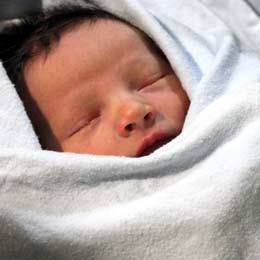Influenza or “flu” is a contagious disease that spreads around the United States every year, usually between October and May.
Why get your child vaccinated?
Flu can lead to pneumonia and blood infections, and cause diarrhea and seizures in children. If you have a medical condition, such as heart or lung disease, flu can make it worse.
Flu is more dangerous for some people. Infants and young children, people 65 years of age and older, pregnant women, and people with certain health conditions or a weakened immune system are at greatest risk.
Each year thousands of people in the United States die from flu, and many more are hospitalized.
There is no live flu virus in flu shots, they cannot cause the flu.
The seasonal flu vaccine protects against the influenza viruses that research indicates will be most common during the upcoming season.
When should your child get the flu vaccine?
The CDC recommends that everyone 6 months of age and older get a flu vaccine each year. Flu vaccination can reduce flu illnesses, doctors' visits, and missed work and school due to flu, as well as prevent flu-related hospitalizations.
A dose of flu vaccine is recommended every flu season. Children 6 months through 8 years of age may need two doses during the same flu season. Everyone else needs only one dose each flu season.
It takes about 2 weeks for protection to develop after vaccination, and protection lasts through the flu season.
Medications
Well-Child Checkups
Other Routine Immunizations We Provide
-
Diphtheria, Tetanus, and Pertussis (DTaP)
Diphtheria, tetanus, and pertussis are serious diseases caused by bacteria. Diphtheria and pertussis are spread from person to person. Tetanus enters the body through cuts or wounds.
-
Hepatitis A
Hepatitis A is a serious liver disease caused by the hepatitis A virus (HAV). HAV is spread from person to person through contact with the feces (stool) of people who are infected, which can easily happen if someone does not wash his or her hands properly.
-
Hepatitis B
Hepatitis B is a serious disease that affects the liver. It is caused by the hepatitis B virus. Hepatitis B can cause mild illness lasting a few weeks, or it can lead to a serious, lifelong illness.
-
Hib (Haemophilus Influenzae Type B)
Haemophilus influenzae type b (Hib) disease is a serious disease caused by bacteria. It usually affects children under 5 years old. It can also affect adults with certain medical conditions.
-
HPV
HPV vaccine prevents infection with human papillomavirus (HPV) types that are associated with many cancers.
-
Influenza - Inactivated
Influenza or “flu” is a contagious disease that spreads around the United States every year, usually between October and May.
-
Measles, Mumps, Rubella (MMR)
Measles, Mumps, Rubella, and Varicella (chickenpox) can be serious diseases. These diseases can spread from person to person through the air. Varicella can also be spread through contact with fluid from chickenpox blisters.
-
Measles, Mumps, Rubella & Varicella (MMRV)
Measles, Mumps, Rubella, and Varicella (chickenpox) can be serious diseases. These diseases can spread from person to person through the air. Varicella can also be spread through contact with fluid from chickenpox blisters.
-
Meningococcal Conjugate Vaccines (MCV)
Meningococcal disease is a serious illness caused by a type of bacteria called Neisseria meningitidis. It can lead to meningitis (infection of the lining of the brain and spinal cord) and infections of the blood.
-
Serogroup B Meningococcal (MenB)
Meningococcal disease is a serious illness caused by a type of bacteria called Neisseria meningitidis. It can lead to meningitis (infection of the lining of the brain and spinal cord) and infections of the blood.
-
Pneumococcal Conjugate (PCV13)
Pneumococcal disease is caused by bacteria that can spread from person to person through close contact. It can cause ear infections, and it can also lead to more serious infections .
-
Polio
Polio is a disease caused by a virus. It is spread mainly by person-to-person contact. It can also be spread by consuming food or drinks that are contaminated with the feces of an infected person.
-
Rotavirus
Rotavirus is a virus that causes diarrhea, mostly in babies and young children. The diarrhea can be severe, and lead to dehydration.
-
Tdap (Tetanus, Diphtheria, Pertussis)
Tetanus, diphtheria, and pertussis are very serious diseases. Tdap vaccine given to pregnant women can protect newborn babies against pertussis.
-
Varicella (Chickenpox)
Chickenpox (also called varicella) is a common childhood disease. It is usually mild, but it can be serious, especially in young infants and adults.
Immunization Schedules from the CDC
Easy-to-read formats to print, tools to download, and ways to prepare for your office visit.





















